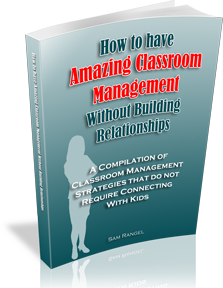I’ve been asked a lot about dealing with students who are being disruptive in class. I always tell them that there are different levels of disruption. The more serious disruptions need to be handled immediately with the student being sent out of class to the office. The more common disruptions, however, can be, and should be, handled in class. 
These are the disruptions where the student is talking while you are talking, or where the student is in some other small way distracting another student.
Every class is different, and there is no one-size-fits-all discipline plan. I do know, however, that you have to give students a warning before you lower the boom. This is where a lot of new teachers make their mistake. They don’t allow students to be imperfect. They are kids, not robots. Accepting this is the first part of any discipline plan.
Students will want to test your limits. They will want to see how much they can get away with. It’s a normal part of their being. You have to be careful not to be too strict, but at the same time you don’t want to be too lenient. Here is what I do.
If a student is talking when he/she should be quiet, I’ll first give him/her the “look.” I’ll stop what I’m doing, and just look at him/her. If they stop, then I continue on as if nothing happened. I’ve made my point.
If the student continues, then I’ll stop again and call the student’s name, and say, “That’s one.”
The students have already been told that they only get one warning. Normally, that’s all it takes for the student to catch on. If, for instance, the student continues, I’ll stop again, call the student’s name, and say, “That’s two.”
Again, the students have already been told that when I get to “two,” it’s a detention – 30 minutes after school the following day.
If it ever gets to three, it’s no longer a minor disruption. It’s defiance, and the administration gets involved.
It has been very rare, however, that I’ve had to get to the third warning. The main reason for this is that I keep my promises. If I promise a detention, I don’t change my mind. I don’t forget about it. I don’t give a student a break if they say, “Please, please, please.” You give the students that one warning, letting them know that one mistake is acceptable, but more than one is not. Be consistent. Be fair. Be firm.
Don’t let those minor disruptions get out of hand. If you let one student get away with it, then others will start. It can make for a stressful year.
This strategy works for me, and I teach eighth graders – yes, eighth graders, so I think I know what I’m talking about.
I’d like to know what you think. What do you do in your class to control minor disruptions?
Sign up for my RSS feed or the SITC newsletter, and I’ll let you know when I post something new.
Thanks,
Sam




Here’s what would happen when I used a similar strategy (6th and 7th graders): they would get the warning for one behavior i.e. talking, then switch to another one such as tossing something across the room. They would get the consequence for 2 infractions, but I would always get the argument that they hadn’t repeated the first offense so it was unfair. This was a couple of students, not the majority.
CJ Gray
Hello CJ. Thank you for your comment. I spent my entire career teaching 7th and 8th graders, so I know what you’re talking about. They’re quick to find the loophole in every rule. : )
What I would tell the student is that the warning was for “class disruption,” not for talking or tossing something across the room. Anytime a student takes time away from the other students’ learning, it’s a warning. I wouldn’t have a lengthy debate about the issue. If the student continues to take time from the class with his/her arguing, just tell him/her that you will be happy to discuss the matter after school or during lunch, and move on.
Hope this helps.
Thank you again for your comment,
Sam
Yes, thanks for validating. Whenever they wanted to argue that I was being unfair I would just say ‘bummer’ and move on. I’ll be sure to establish the generality of the rule more clearly in the beginning.
Hello CJ. When kids tell me that I’m being unfair, I ask them how fair it is for them to keep other students from learning or for keeping me from doing my job. Again, I don’t spend a lot of time discussing this, but it’s a good after-class conversation. Thank you again for your comment.